Face Mask – a Cash Cow for Moldovan Businesses

The coronavirus outbreak in Moldova triggered a face mask crisis. The crisis was also fueled by a governmental decision issued at the end of February. The decision listed medical masks as socially important products, limiting the face masks markup to 20 percent. The companies deemed the face masks import as uneconomical and some of them decided to step back. In March this year, Moldova was facing a slump in face mask supplies and an increasing demand for the product. The scarcity of face masks skyrocketed the prices, luring local companies to jump on the face mask bandwagon.
Since March 2020, hospitals have signed over 126 direct contracts with companies, purchasing face masks worth over 189,000 euros.
Although the World Health Organization (WHO) recommended for the healthcare workers engaged in the fight against the COVID-19 infection not to wear masks from cotton, fabric, or gauze, several hospitals procured over 300,000 masks of this type. Meanwhile, Moldova has become the country where about 2,700 health workers got infected with the new type of coronavirus, and 28 of them died. About 14 percent of the people who test positive for COVID-19 are in the medical system.
While analyzing the price for surgical face masks, ZdG concluded that the high price pushes senior citizens to use the same un-sterilized mask several days in a row.
Since May 15, the authorities declared that it is mandatory to wear protective masks in public transport, in closed public spaces, as well as in semi-closed or open spaces, where there is not possible to respect the social distancing.
The National Agency for Public Health (ANSP) recommended people to use for personal protection mainly disposable masks (surgical) and textile masks, which can be reused.
In early March this year, Moldova registered the first official case of COVID-19 infection. Masks became indispensable in hospitals. On March 19, the WHO warned that while the masks made of fabric, cotton or gauze can be used by the people, these masks are not recommended for medical staff involved in the fight against the new type of coronavirus.
Mulțumim că citești ZdG!
Ajută-ne să continuăm să furnizăm informații esențiale — donează pentru jurnalismul nostru.
However, ZdG found that dozens of medical institutions involved in the fight against the virus purchased no less than 300,000 masks of this type to ensure the protection of medical workers during the same period. Meanwhile, Moldova has become the country where about 2,700 health workers got infected with the new type of coronavirus, and 28 of them died.
About 14 percent of the people who test positive for COVID-19 are in the medical system.
The Masks from the Hospitals
The World Health Organisation Recommendations and how Moldova’s Hospitals Comply
At the end of February, the international and national press was writing about the deficit and exaggerated prices for masks. The Government included medical masks, gloves, and medical disinfectants on a socially important product list. The Government also mentioned that the markup for these products can not exceed 20 percent. Following the Government’s decision of February 26, the companies felt discouraged to import masks.
When the masks crisis intensified, more and more companies jumped on the face masks bandwagon. The ANSP mentioned that local producers addressed the Government, the Ministry of Health, and ANSP with proposals to manufacture protective equipment since March 6, 2020. During this period, the ANSP approved sanitary 42 companies to produce protective equipment, including masks from 100 percent cotton, or plastic visors.
According to the ANSP, 17 approved companies, made masks of polymeric materials with a certain degree of protection. These masks were good for the medical staff, except for those involved in the diagnosis and treatment of COVID-19 patients. The personal protective equipment must meet other standards for these doctors.
Answering to ZdG’s questions, ANSP mentions that the authorities provided medical personnel with protective equipment mainly imported and received as humanitarian aid. Since March 2020, medical institutions have signed no less than 126 direct contracts with companies, purchasing protective masks worth over 189,000 euros (3.7 million lei).
On March 20, the Center for Centralized Public Procurement in Health (CAPCS) bought 250,000 protective masks through a centralized auction. The masks had a total value of around 45,000 euros (875,000 lei). The Center distributed the goods to hospitals and encouraged the directors of medical institutions to sign direct contracts with companies for the purchase of masks. The Center stated that procuring them through public tenders takes a longer time. Subsequently, the CAPCS identified 10 companies, who had or would have protective masks in the near future. Most of these companies were local producers, who made cotton masks. However, later it was found that the companies did not have adequate sanitary approval for their goods to be used by medical workers.
Thousands Of Cotton Masks For CNAMUP
Although the WHO warned against the use of masks made of fabric, cotton or gauze by medical personnel involved in the fight against the COVID-19 infection, tens of medical institutions in the country purchased hundreds of thousands of such masks. The National Center for Pre-hospital Emergency Medical Assistance (CNAMUP) made one of the largest cotton masks acquisitions. On March 26, Russca state-owned enterprise signed a contract with CNAMUP and sold to the CNAMUP 178,000 cotton non-sterile masks. The total value of the contract reaches 41,000 euros (801,000 lei), around 0.23 euros (4.5 lei) for one mask.
Boris Golovin, the director of CNAMUP, claims that he selected these masks because Russca state-owned enterprise offered the best price. Thus he respected the Public Procurement Law.
“These masks were designed for healthcare workers and patients. According to the Public Procurement Law, we have tendered for the cheapest masks and the masks that meet all the requirements. They meet all the requirements. The epidemiological health service certified that the masks could be used in medical institutions as protective masks. We have all the papers,” explains the director of CNAMUP.
Subsequently, the head of CNAMUP sent us the sanitary approval for the masks. However, the ANSP list of companies approved to produce masks highlights that the articles made by Russca can be used for individual protection, but the masks are not intended for medical workers, especially those involved directly in fighting the COVID-19 infection.
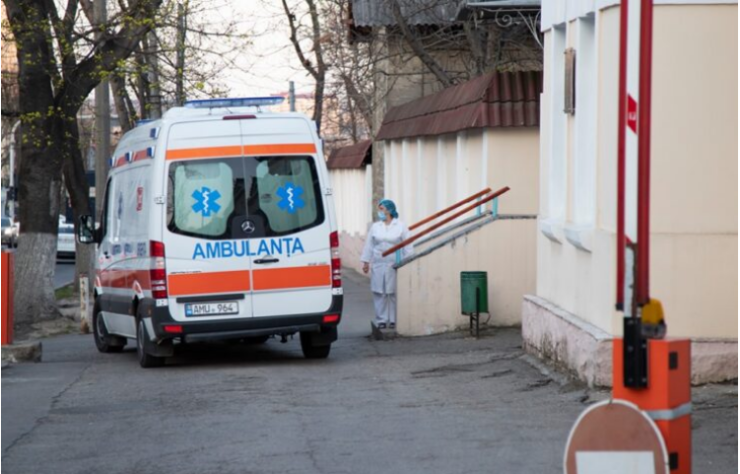
Sergiu Bălan, the administrator of Russca, an institution located on the territory of the penitentiary bearing the same name, claims that the production of cotton masks started with the onset of the state of a public healthcare emergency. Bălan states that the masks are not for protection. The masks are meant to prevent the transmission of the infection.
“We are the only manufacturer of cotton masks in Moldova, registered in the state register of medical devices at the Medicines and Medical Devices Agency. They are fit for all institutions because we make them according to the requirements, for everyone. We sell masks to prevent the spread of infection. The masks are not for protection. There are respirators for protection. The masks are not protective,” says the administrator of the state enterprise.
Cotton Masks In Other Hospitals, Against The Recommendations Of The WHO
On March 26, Russca state-owned enterprise signed a contract worth approximately 11,000 euros (215,800 lei) with the National Administration of Penitentiaries to deliver 53,300 masks of the same type. According to this contract, the price of a mask was 0.21 euros (4.05 lei).
Russca state-owned enterprise was registered in 1992. The National Administration of Penitentiaries founded it, and Sergiu Bălan is its administrator. According to the 2019 financial report, the state-owned enterprise declares an equity capital of over 230,000 euros (4.5 million lei) and over 502,000 euros (9.8 million lei) from sales.
At the end of March, the Șarm company sold 21,600 un-sterilized cotton masks to the Institute of Cardiology and the Oncological Institute, which treated patients with COVID-19 since April 9. The total value of the contracts was over 8,400 euros (165,000 lei), and the price of a mask was different in both contracts 0.31 and 0.4 euros (6 lei and 7.75 lei).
According to ANSP, the company received a health permit for the production of masks from artisanal materials. However, these masks can be used for individual protection, and are not suitable for the medical staff, especially for those involved in diagnosing and treating COVID-19 patients.
Contacted by ZdG, the head of the procurement department of the Institute of Cardiology claims that these masks were purchased in full personal protective equipment crisis. The institution procured what was available to ensure the protection of the medical staff and to cope with the epidemiological situation.
“They were meant for the medical personnel fighting against COVID-19. I bought masks of all kinds, including surgical, cotton, of different quality. There was a mask crisis. We bought from whoever had masks to provide the staff and to respect the epidemiological sanitary requirements. At that stage, we were not a COVID center. It was a preventive measure to provide the staff with the minimum necessary equipment and to comply with the epidemiological requirements,” said the institution employee, who refused to make the discussion with him public.
Larisa Catrinici, director of the Oncological Institute, refused to speak to the ZdG. Rodica Tomașenco, the press officer of the institution, confirmed that the Institute purchased the masks because of the coronavirus pandemic.
Șarm company was registered in 1992 as a fabric store and has been transformed into a production company since 2006. Currently, Mihail Zaichin is its manager. According to the data on the company’s website, its main activity is sewing underwear sets and work-clothes, production of quilted duvets and pillows from silicone. The company’s main customers are state-owned enterprises, hospitals and kindergartens.
Previously, Șarm company won several tenders with various state institutions, delivering its products, especially to medical institutions subordinated to the Ministry of Health. According to the 2018 financial report, the company declares an equity capital of approximately 359,000 euros (7 million lei), and approximately 354,000 euros (6.9 million lei) revenues from sales.
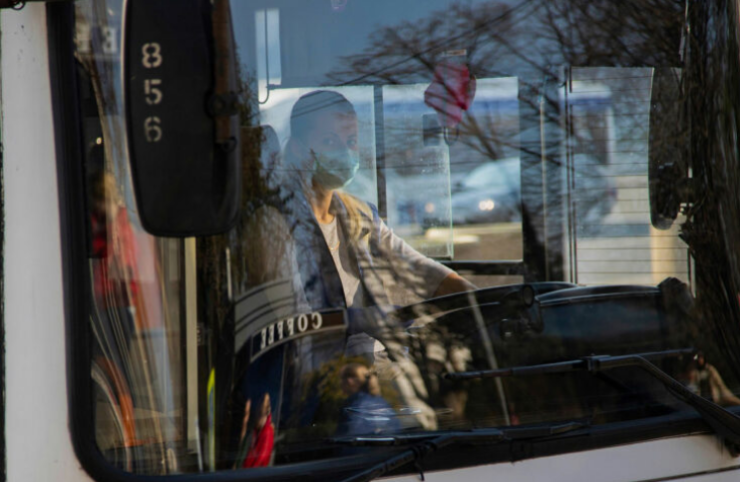
In Moldova, No Company Had Disposable Surgical Masks in Stock
During the COVID-19 health crisis, Nikita Rinadi company signed 10 contracts with several medical institutions. The institutions purchased white medical masks at the cost of 0.38 euros (7.4 lei) per unit. The total value of the contracts is approximately 8,104 euros (157,600 lei). According to the National Agency for Public Health (ANSP), the company’s masks are made of cotton and are not approved for medical use.
On March 26, 2020, Criuleni District Hospital, in the central-east of Moldova, signed a contract with Nikita Rinadi company, purchasing 3,000 masks worth over 1,000 euros (22,200 lei). Sergiu Halipli, the director of the Criuleni District Hospital, claims that the masks were for the employees of the hospital. He states that they selected these masks because there were no surgical masks on the Moldovan market. In addition, the company offered the lowest price for the cotton masks.

“In Moldova, no company had disposable surgical masks in stock. We signed one contract for cotton masks. Initially, the World Health Organization (WHO) and the Ministry of Health did not say that cotton masks are not good. Later, the WHO warned that the cotton masks are not suitable and we stopped any purchase of cotton masks according to the WHO recommendations. And only the doctors, who did not work with COVID-19 patients or persons suspected of being infected with COVID-19, used the masks we purchased,” says the director of the district hospital.
Nikita Rinadi company was registered in 2015 and represents the local clothing brand of the same name. Nadejda Tatarciuc is the founder and manager of the company. According to the 2019 financial report, the company recorded sales revenues amounting to over 27,000 euros (532,100 lei).
Nadejda Tatarciuc refused to speak to ZdG and urged us to send the questions in writing. We sent the written questions, but we have not yet received an answer.
During this period, the Artbutic company signed contracts worth over 6,000 euros (121,000 lei) with several health centers for delivering masks. The ANSP approved the non-woven protective masks, made by the company, but the masks were to be used by medical employees who are not involved in the fight against the new coronavirus. However, during this period, the company sold masks made of cotton, which can be used only for individual protection according to ANSP.
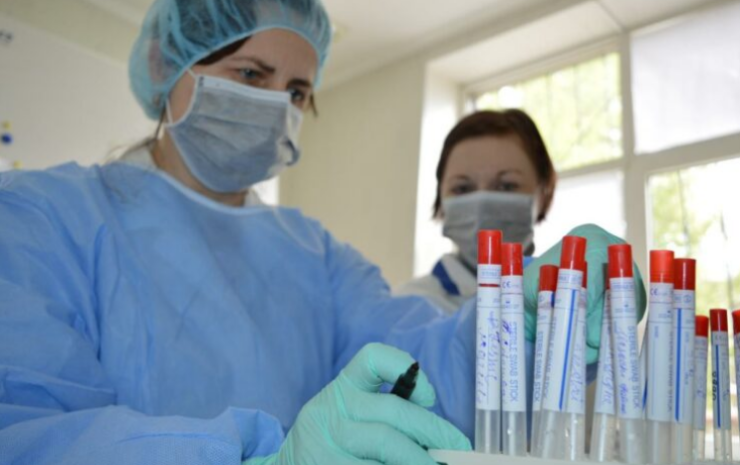
The price indicated by the company for CAPCS was 0.38 euros (7.45 lei) for a reusable cotton mask. Later, the company sold its masks at the costs that ranged between 0.45 and 0.57 euros (8.69 lei and 11 lei) per unit. At the same time, ZdG found that several pharmacies sell the company’s masks for 0.56 euros (10.80 lei) per unit.
Contacted by ZdG, Evelina Zara, the company’s owner, told us that most of the masks produced by her company are made of three layers and offer maximum protection.
“The masks were accepted. These masks have two layers of cotton and a layer of polypropylene in the center. Masks like this were used back in the Soviet times when there was a plague. There were 10 layers of gauze and the world came out of the epidemic very quickly. Nowadays, modern methods of protection have emerged. However, nobody excluded cotton masks from the list of protective equipment, including for doctors. In my opinion, the masks offer maximum protection, but I am not an epidemiologist, I am not a doctor or a researcher. My job is to produce masks according to the requirements, and the doctors’ job is to wear them correctly,” says Zara.
When asked about the differences in mask prices in the contracts she signed with medical institutions, the Zara explained that the price fluctuates depending on the number of masks requested. She mentioned that the bigger the supply requested – the lower the price.
“In our country, wholesale prices fluctuate up to 0.46 euros (9 lei). The Public Procurement Agency wanted to buy 1 million masks, so we requested the price of 0.38 euros (7.45 lei) per mask. And when the requested supply is lower, the price increases. When you tell a fabric manufacturer that you’re going to order a million meters of cloth, believe me, he’s going to put in only five pennies. When you order only 10,000 meters, the price automatically goes up 60 percent. When you know you have to sew a million masks, the whole production sews masks from morning to evening and the workers’ efficiency and speed increase, and production costs decrease enormously. When the orders fluctuate, you cannot plan your production, and then costs increase. In addition, our masks have three layers of fabric. The cost of the fabric is 50 percent of the price of the finished product,” says Evelina Zara.
The company founded by Evelina Zara in 2012, represents the Vivi Art Boutique brand. The company jumped on the face masks bandwagon in mid-March. Evelina Zara is the wife of Vladislav Zara, the former general-director of Medicines and Medical Devices Agency, dismissed from office by the Government led by Maia Sandu, ousted in November 2019 by the Socialist – Democratic Party coalition. Currently, Vladislav Zara is deputy director of the Public Services Agency. According to the 2019 financial report, the company recorded sales revenues of about 129,000 euros (2.5 million lei).
Top Surgical Masks Suppliers to Medical Institutions
ZdG analyzed all 126 officially registered public procurement contracts, through which state institutions (especially health institutions) purchased protective masks. ZdG aimed to identify the suppliers that have profited the most from this health crisis.
Manarski Trading company sold the biggest amount of protective masks, produced in Moldova during this period, to state institutions. This local manufacturer of medical supplies obtained over 51,000 euros (1 million lei) from selling protective masks.
On March 20, 2020, Manarski Trading signed with the Center for Centralized Public Procurements in Health (CAPCS), a branch of the Ministry of Health, a contract worth around 45,000 euros (875,000 lei), undertaking to deliver 250,000 medical masks at a price of 0.18 euros (3.5 lei) per unit. Subsequently, in April and May this year, the company signed other eight individual contracts with four medical institutions in the country, delivering masks with a total value of over 7,400 euros (145,000 lei).
In many contracts, the company requested a price of 0.18 euros (3.5 lei) per medical mask. However, in two contracts, signed in May, the company requested a price of 0.21 euros (4 lei) per item.
Manarski Trading company also benefited from the donations made to the medical institutions, as well as to other state institutions. The donation, made by the U.S. Embassy in Moldova for the Ministry of Internal Affairs, as well as other charitable donations, contained the masks of the company.
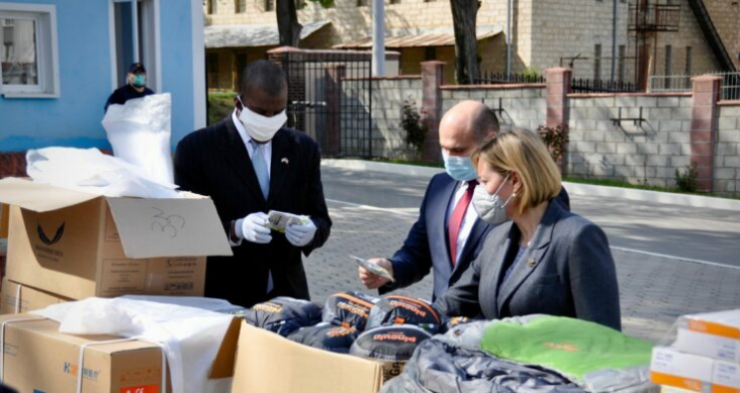
ZdG also found that during this period the company has been selling masks in several pharmacy networks at prices ranging between 0.32 and 0.4 euros (6.28 and 7.75 lei). The company’s masks were also sold on ad websites. On these websites, boxes of 50 masks each can be purchased, the price of one mask ranging between 0.26 and 0.36 euros (5 and 7 lei).
Nadejda Morsy, the manager of Manarski Trading company, informed us that the company completed the delivery of protective masks on May 15 this year, according to the contract previously signed with the CAPCS, a branch of the Ministry of Health.
The manager of the company pointed out that although the company’s daily production capacity is at least 20,000 masks, the company delivered to hospitals 7,200 masks daily, or every other day, depending on how the company coped with the production.
The manager of the company claims that the price of a mask was 0.05 euros (1 leu) until the pandemic, but the prices increased due to higher prices for raw materials.
“The price of raw materials has also increased. Previously, we imported from China, but we could no longer import from China when the pandemic started. Thus, we found a manufacturer here in Moldova, but the price was much higher. The price is based on all the expenses, including the trading markup, of course,” the company manager reports.
According to Nadezhda Morsy, the company is to provide protective masks to the institutions subordinated to the Ministry of Internal Affairs, as well as to 12 other public hospitals.
“We also have contracts with state hospitals, some private hospitals, and the institutions that belong to the Ministry of Internal Affairs (the General Police Inspectorate, the National Patrol Inspectorate). We have contracts signed individually with each hospital (Glodeni, Bălți, Căușeni, Anenii Noi, the Emergency Hospital, the Republican Hospital, the Military Hospital, the Center of Mother and Child, the Institute of Neurology and Neurosurgery, the Institute of Phthisiopneumology, the Holy Trinity Hospital and the Municipal Clinical Hospital for Infectious Diseases for Children),” lists the representative of the company.
In addition, Nadezhda Morsy is the director of Had-Teh-Agro foreign-owned company. Her husband, Ayoub Ali Ahmed Morsy, founded it in 2004, together with two other foreign nationals, Hassaan Hassan and Hassaan Hussein, who are also the founders of Sina Pharm Investment Company, registered in 2007. Sina Pharm Investment Company is selling pharmaceutical products in specialized stores.
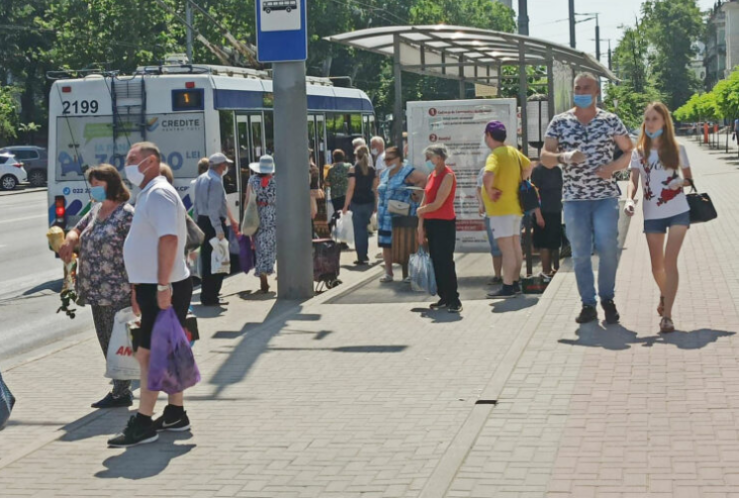
Manarski Trading company was registered three years ago. The company’s founder and manager, the foreign citizen Shahin Moh, is also the founder of Al Hasm Trading company, registered in 2016. According to the site, the Manarski Trading company specializes in the production and sale of medical supplies and disposable items such as surgical masks, puff caps, and disposable boots. According to the latest available financial report, in 2018, the company’s equity capital was around 18,000 euros (348,900 lei).
The Becor pharmaceutical warehouse, a joint enterprise, sold the largest amounts of imported masks to medical institutions during the COVID-19 health crisis. During this period, the joint enterprise signed contracts to deliver to medical institutions protective masks worth about 22,000 euros (419,200 lei).
The joint enterprise sold surgical masks, cotton masks, and KN95 masks. The mask prices per unit fluctuated, depending on the contract.
In May, the joint enterprise signed four contracts, committing to deliver N50 surgical masks to health institutions. The prices fluctuated between 0.37 and 0.57 euros (7.2 and 11 lei) per unit. Although the three contracts, for the cotton masks, were signed on March 30 and 31, the price fluctuated between 0.3 and 0.42 euros (5.9 and 8.25 lei) per unit.
The Becor joint enterprise was registered in 1997. It was registered with two founders, Iurie Bezer and the Sunstring offshore, located in Cyprus, but liquidated on January 22, 2020. According to the 2019 financial report, the enterprise had an equity capital of over €5.72 million (111.4 million lei) and recorded sales revenues of over €22.79 million (443.3 million lei). The Sunstring offshore, which founded Becor, is the founder of Elody-Farm, the company that owns the Elody pharmacy network. In recent years, Becor joint enterprise has won hundreds of contracts with public medical institutions. During March-June 2020, Becor joint enterprise signed contracts with the public health institutions worth over 442,000 euros (8.6 million lei).
ZdG contacted the representatives of the company, but they asked for the questions in written form. Until now, we didn’t receive an answer from them.
The Masks in Pharmacies
China, the Main Supplier of Masks for Moldovan Pharmacies
ZdG analyzed the types of masks sold in pharmacies, their prices, and the companies that supply them. After buying masks from the largest pharmacy networks in our country, we found that the pharmacies sold during this period mainly three types of masks: surgical mask (that is disposable), reusable mask (made of cotton), and KN95 mask, which offers a higher degree of protection.
Although many of the disposable surgical masks are imported from China, pharmacies also sell surgical masks produced by two local companies – Manarski Trading, that sells masks to hospitals, and Filtranium, a company registered at the end of May 2020, in Ialoveni district, the center of Moldova.
The prices of masks imported from China in pharmacies vary between 0.34 and 0.44 euros (6.68 and 8.52 lei). In several drug warehouses, the masks can be purchased at a price that is around 0.31 euros (6 and 6.12 lei).
We requested the quota for 100,000 surgical masks (similar to the masks sold in pharmacies and drug warehouses in our country) from three Chinese companies. This information helped us understand the price formation of the imported Chinese masks, sold in Moldova.
For example, according to its website, the Family Pharmacy, a network of pharmacy, has been selling imported Chinese surgical masks from Shanghai Channelmed Group company. On June 26, 2020, ZdG journalist bought from these drug stores a surgical mask produced in China, paying for it around 0.34 euros (6.68 lei). The Dita Est Farm drug warehouse, which owns the Family Pharmacy network, delivers the masks to the Family Pharmacy network for 0.31 euros (6.12 lei) per unit.

On July 6, 2020, requested by ZdG, Shanghai Channelmed Group offered us the quota for 100,000 surgical masks – 0.0713 dollars (0.06 euros) or around 1.22 lei for one surgical mask. The masks offered by the Shanghai Channelmed Group are similar to the one purchased for 0.34 euros (6.68 lei) on June 26.
On July 9, we requested the quota for transporting the 100,000 masks (amounting to 692 kilograms) from one of the companies that offer international freight transport services.
The quota for one kilogram amounted to 10.77 euros. Subsequently, transporting 100,000 masks would cost about 7,400 euros (145,000 lei).
Therefore, we added to the total value of the goods the transportation cost from China, the customs duty (15 percent), other expenses (0.4 percent), and the VAT amount (20 percent of the total amount). We divided the amount obtained by 100,000 masks and found that the price of a surgical mask would reach 0.19 euros (3.72 lei) without the 20 percent markup the companies can charge. We also computed another price, adding the 20 percent markup that can be charged according to the law and obtained that the price of a surgical mask would reach 0.23 euros (4.46 lei).
We mention that these prices are approximate and do not take into account the period in which the imported Chinese masks arrived in Moldova, nor the real price at which they were purchased in that period.
Contacted by ZdG, the representative of the Family Pharmacy explained that at the beginning of the pandemic the prices of masks in China have skyrocketed.
“Prices in China have skyrocketed since the beginning of the pandemic. Subsequently, alternative mask suppliers emerged. Even local businesses began producing masks.
Demand gradually began to decline. Thus in China, the prices gradually returned to normal. The competition was very high because everyone was producing masks. Subsequently, they had a reason to lower the prices. Now, they have almost returned to the prices set before the pandemic. All the goods from China were brought by sea before, as sea transport was very cheap, now they bring the goods by plane.
During the pandemic, everyone had to import goods by air transport to Kyiv and car transport to Moldova, and transport costs were high. The final consumer has to pay all these expenses,” explained the representative of the Family Pharmacy.
The price of a surgical mask from China at the Gedeon Richter pharmacy network is 0.34 euros (6.60 lei). On the pharmacy website, we find that the masks are produced by Leboo Healthcare Products, a Chinese company.
On July 6, 2020, the Chinese company answered to our request and offered a 0.1 dollars (0.09 euros) quota for the same amount of 100,000 surgical masks. This is about 1.72 lei for one surgical mask. We followed the same steps, described above, and determined that the price of a mask would reach 0.23 euros (4.39 lei), and around 0.27 euros (5.26 lei), when we added the 20 percent markup.
We again mention that the price is approximate and does not take into account the period and the price the pharmacy paid for the imported Chinese masks. We can not exclude that the purchase price of the masks was higher than the price proposed by the Chinese companies in July.
On July 6, Shaoxing Gangfeng, another Chinese company, whose masks are found in this network of pharmacies, offered a 0.13 dollars (0.11 euros) quota for one surgical mask, which is about 2.23 lei. If we would import this type of mask, its price here would be 0.26 euros (5.1 lei), and 0.31 euros (6.12 lei) with the 20 percent markup.
Although the surgical masks of Manarski Trading are produced in Moldova, their price in the Gedeon Richter pharmacy network amounts to 0.4 euros (7.7 lei) per unit.
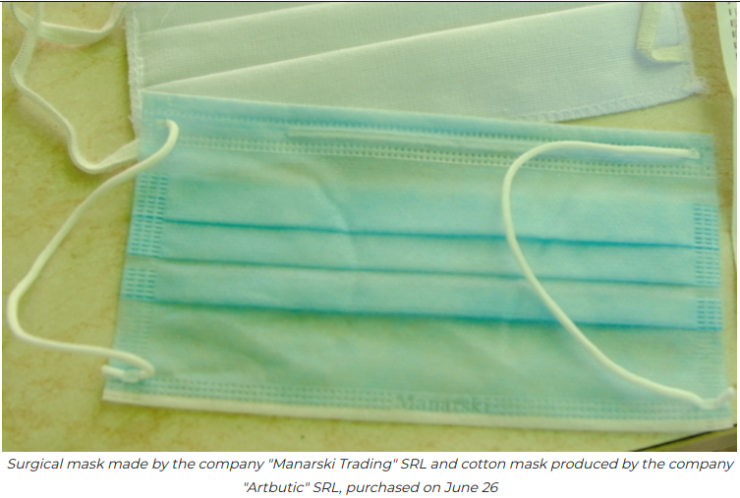
Contacted by ZdG, Nadejda Morsy, the manager of Manarski Trading, claims that the company does not deliver masks to pharmacies. However, they concluded a contract with a drug company at the beginning of this year. They sold masks to this company with a price amounting to 0.21 euros (4 lei) per item.
Contacted by Ziarul de Gardă, Iurie Catană, the leading pharmacist of the pharmacy network, states that “we set the new prices in accordance with the legislation in force. This is like an answer to all your questions.”
Pharmacies Sell Masks, Produced by Local Companies
The Orient pharmacy network only sells imported Vietnamese surgical mask for a price of 0.44 euros (8.52 lei) per unit.
At the request of ZdG, Tanaphar, the Vietnamese company that produces the masks indicated that the price of a mask is 0.106 dollars (0.09 euros) or 1.82 lei.
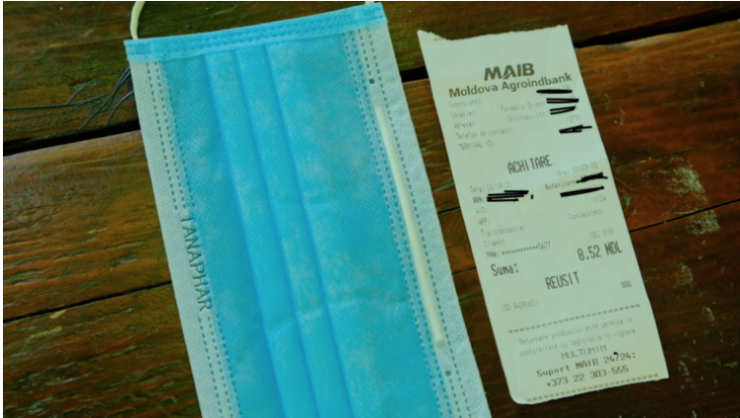
Vietnam and China are in the same area. According to the company that offers international transportation services, the transportation cost is the same. We again added to the total amount (for the same 100,000 masks) the transport expenses, custom duties, VAT, and other additional costs. We find that in July 2020, a mask produced by the Tanaphar company would cost 0.23 euros (4.54 lei) and after adding the 20 percent markup the price reaches 0.28 euros (5.44 lei).
Contacted repeatedly by ZdG, the manager of the Orient pharmacy network did not answer the phone.
In Moldova, the pharmacies also sell cotton masks produced by the local businesses, who jumped into the surgical mask field after the country registered the first cases of COVID-19. On June 26, I bought textile masks at prices varying between 0.43 and 0.56 euros (8.33 and 10.80 lei).
The Artbutic company has the most expensive cotton masks. The masks from this company are sold in several pharmacy networks at a price of 0.56 euros (10.8 lei) per unit.
The Cojocari-Grup company sells cotton masks at a price amounting to 0.49 euros (9.6 lei). The company represents the Vasconi brand, a local manufacturer of knitwear for women, men, and children. Constantin Cojocari is the founder and administrator of the Vasconi brand and the Cojocari-Grup company. He has been managing the company since 2007.
Contacted by ZdG, Constantin Cojocari told us that he is producing masks since March 2020, when the coronavirus epidemic started in Moldova began. He mentioned that the company received the certificates from the state institutions for making the masks. He stated that his masks were made of non-woven material, spun-bond, in three layers, and the prices were determined by the cost of the raw material.
“During that time, everyone raised the price of fabric. Certified fabric costs much more than non-certified fabric. In addition, there was no transport circulating then. No goods were imported in the country. All companies raised the prices. We, as well as a local company in Strășeni, bought from those who imported fabric. The price of the fabric was much higher. If we used to buy it for 4 dollars per kilogram, now it has gone up to 11 dollars per kilogram.
We import even the elastic that is put on the mask. Previously, we paid 1 dollar per kilogram, now it’s 7 dollars per kilogram. This is exactly what local importers did. The price was determined by transportation costs, sewing costs, electricity costs,” states the administrator of the company.
Constantin Cojocari claims that he stopped making masks when the companies got permission to resume their work. He states that it is not convenient for his company to maintain this product, as long as it is included in the list of socially important products. According to Constantin Cojocari, the last stock was sold to pharmacies for about 0.33 euros (6.50 lei) per unit, and the pharmacies are now selling them for 0.49 euros (9,60 lei) per unit.
Violations of the Price Formation for Masks
The State Tax Service is empowered by law to verify the prices for social products, including the price of masks.
According to Sergiu Arhirii, head of the Compliance Department within the State Tax Service, 430 fiscal verification procedures were carried out between March 1 and July 3, 2020.
Following the verifications, the Tax Service identified 34 cases of violation of price regulation on socially important products. The verifications revealed two intermediary companies that obtained an illicit income of over 2,000 euros (40,000 lei) each, by exceeding the markup allowed by the government for selling the surgical masks.

“Based on the information accumulated during the verification procedures, the State Tax Service verifies the manufacturer or importer, checking how they comply during the price formation process on the marketed products.
In case the price formation and application of the price for socially important products is violated, the persons are punished according to the legislation in force, which already falls within the competence of other institutions. At the same time, the companies are to be sanctioned with a fine amounting to 100 percent of the illicit income,” states Sergiu Ahirii.
“Prices Are Disastrous, Especially for Senior Citizens”
People claim that they cannot afford to change their masks according to doctors’ recommendations due to the high prices of masks. Veronica, a pensioner from Chișinău, claims that she has to use a mask for a few days because the masks are very expensive. At the same time, the woman considers that it would be good if pensioners and those who work during this period received masks free of charge.
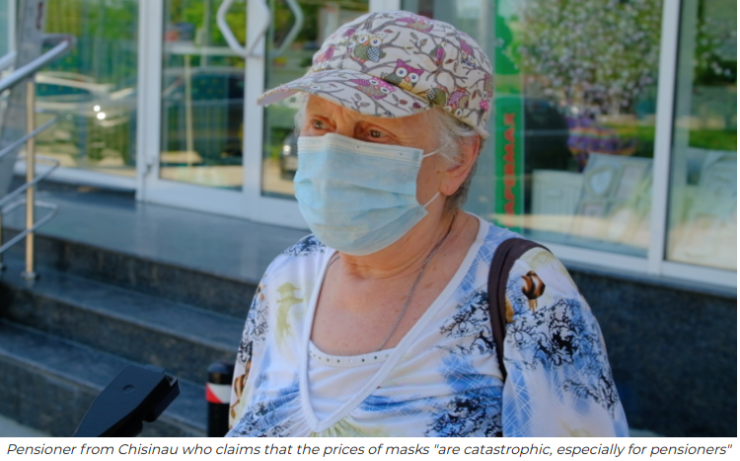
“I cannot afford them. I wear a mask for two or three days and I also have a fabric mask, I wash it and wear it again. In my opinion, it would be appropriate to offer free masks to retirees and to those who work. Subsequently, I suggest having a box of masks at the entrance, in addition to disinfectant,” says the woman.
Another pensioner from Chișinău states that the prices of masks “are catastrophic, especially for us pensioners. I used to buy these masks for 0.03 euros (50 bani coin), but now the cost for one mask ranges from 0.5 euros to 1 euro (10, 12, 20 lei), what is this? ” the woman asks indignantly.
Petru, a young man from Chișinău just bought a cotton mask for around 0.43 euros (8.30 lei). He thinks that mask prices are affordable for young people, but not for the elderly or for disadvantaged groups.
“We, the young people, can get the masks. But for the elderly, who are needier, it’s a little harder. I would say the price is affordable, but not for everyone,” added the young man.
On the websites of Romanian pharmacies, the prices of surgical masks vary between 0.22 and 0.31 euros (4.25 and 5.97 Moldovan lei). At the same time, at the beginning of June, the Romanian authorities adopted a draft law through which disadvantaged people will receive free protective masks.
The Romanian Ministry of Health allocated over €30.97 million (150 million lei) from the state budget for the purchase of masks. Thus, over 1 million Romanians will receive a set of 30 protective masks per month, free of charge.
In Ukrainian pharmacies, the prices of surgical masks vary between 0.38 and 0.49 euros (7,32 and 9,55 lei).
According to the Customs Service, approximately 24,500 tons of masks with a total value of about €4.16 million (80.9 million lei) entered Moldova during January-May 2020. In February 2020, the import of masks increased significantly up to 33,000 euros (637,000 lei) compared to January 2020, when the import of masks was worth over 2,000 euros (41,000 lei). In March 2020, the imports’ value decreased by more than half, reaching around 12,000 euros (232,000 lei).
“We refused to import such goods because of the price volatility. It is not profitable. The regulation of the markup is a problem at the local level. I consider that this problem does not favor the companies and determines them not to import masks, gloves, and disinfectants. Any prohibition leads to a deficit,” explains the representative of a company on the mask market.



